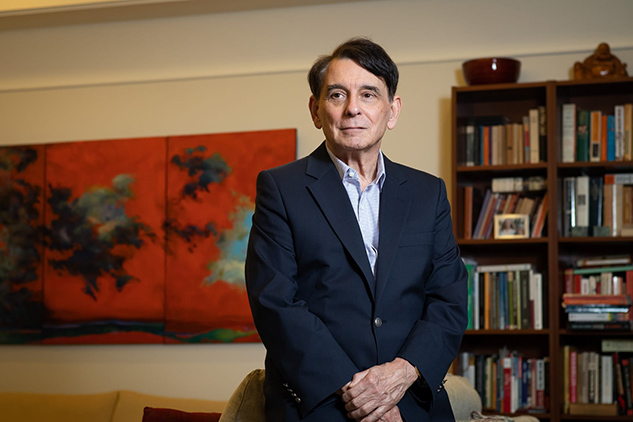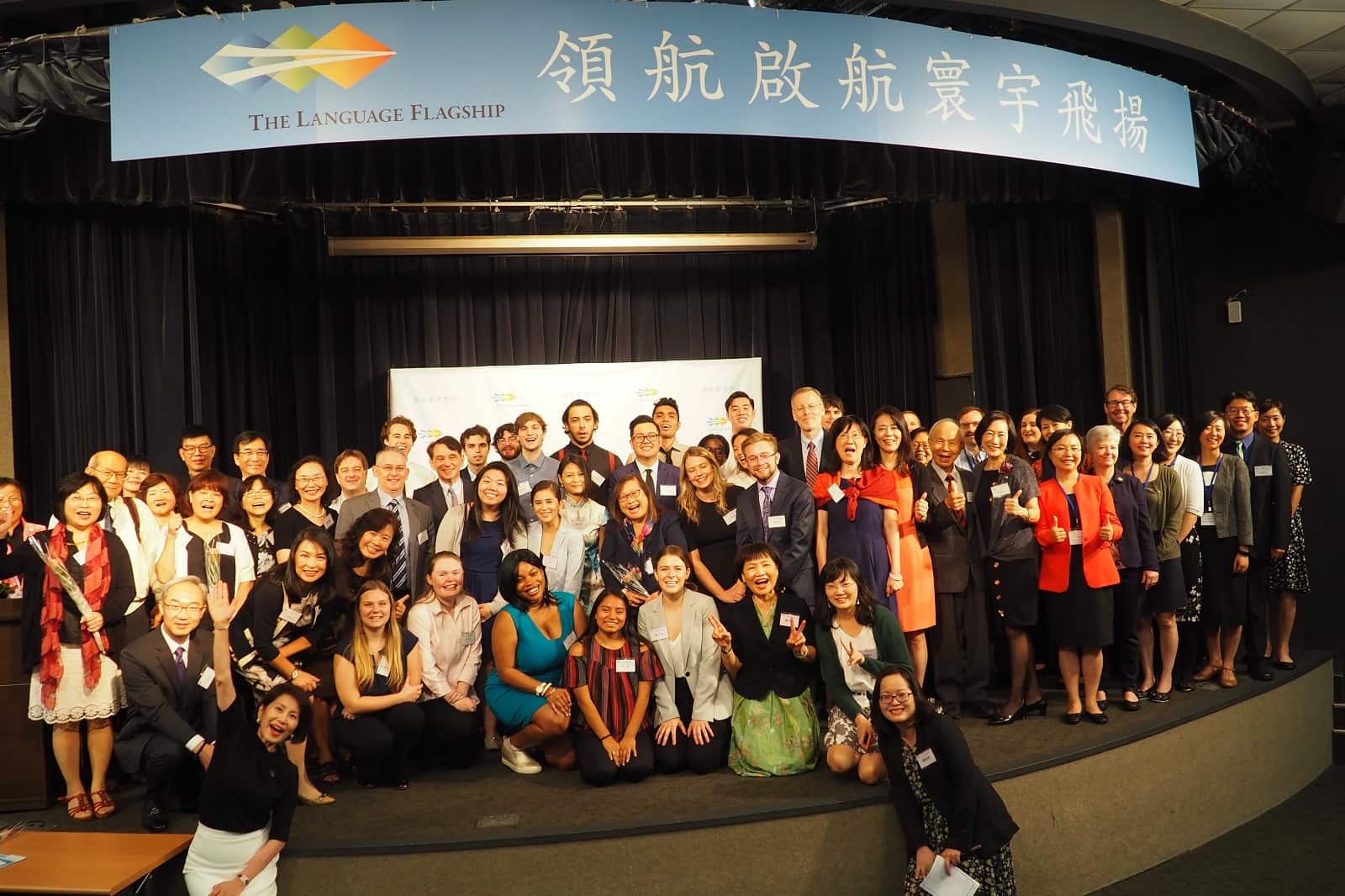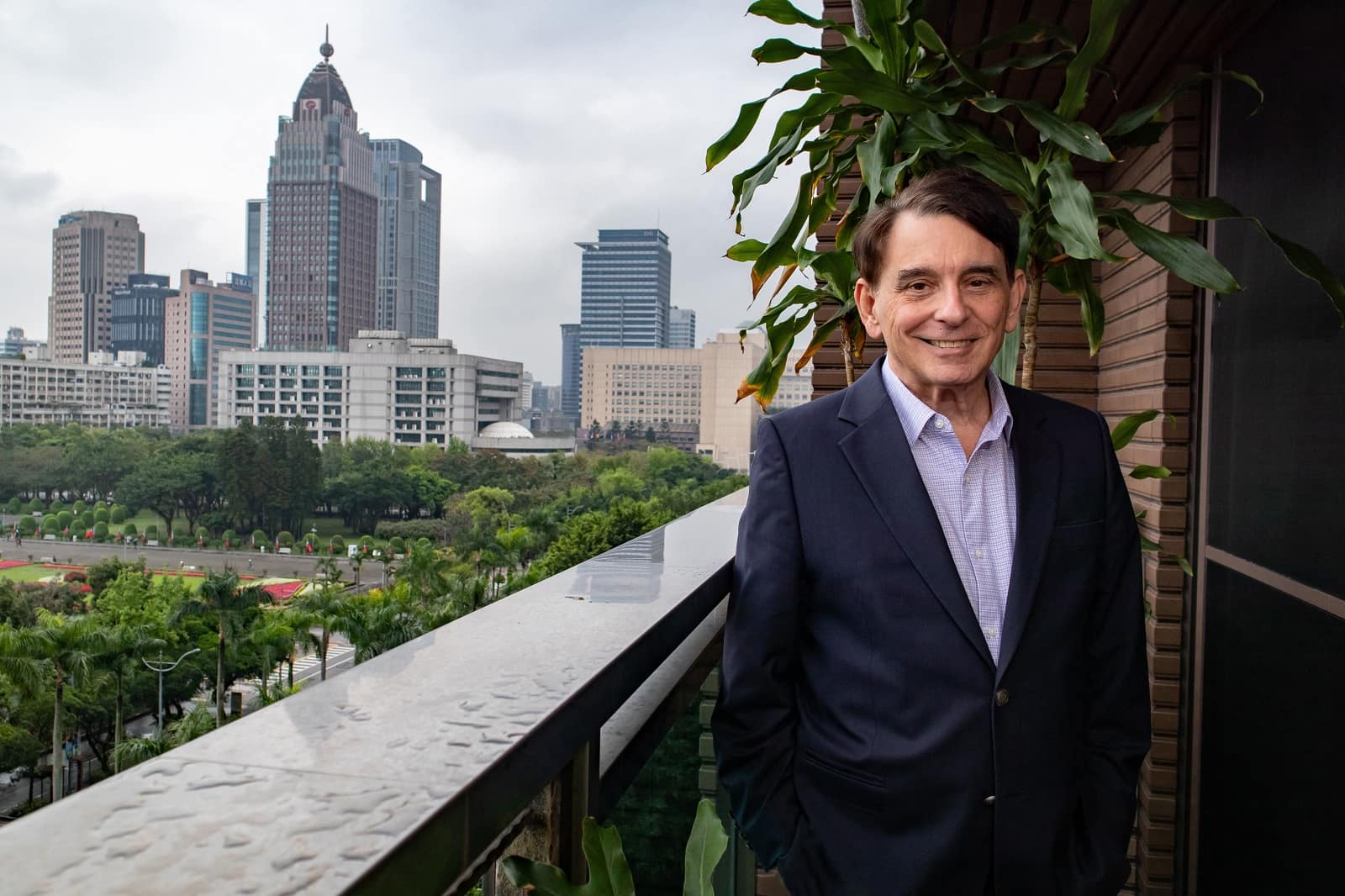Taiwan is Now the Sole US Base for Mandarin Training, Former AIT Director Key Facilitator

Source:Ming-Tang Huang
The Language Flagship initiative, under the United States State Department, moved its Beijing base to Taiwan last year. Now, under the current climate of the novel coronavirus pandemic, the center at National Taiwan University is the only Mandarin training center conducting normal operations, marking a critical milestone in U.S.-Taiwan relations. William Stanton, a career U.S. diplomat and the former director of the American Institute in Taiwan (AIT), has been instrumental in facilitating the establishment of a Mandarin training base in Taiwan.
Views
Taiwan is Now the Sole US Base for Mandarin Training, Former AIT Director Key Facilitator
By Linden ChenFrom CommonWealth Magazine (vol. 694 )
The National Taiwan University campus is a bit subdued as the COVID-19 pandemic rages worldwide. Despite this, 22 American university students in a classroom beside Drunken Moon Lake are abuzz, excitedly describing their experiences living and interning in Taiwan in recent months.
These are the first tier of students to come to Taiwan with the U.S. government-sponsored Language Flagship program. They arrived in Taiwan last October, each with a foundation of three to four years of Mandarin under their belts, to glean professional know-how in different departments at NTU, all conducted in Chinese. This is a vastly different arrangement from typical dedicated Mandarin language programs.
Funded by the U.S. Department of Defense and founded in 2004, The Language Flagship’s mission is to train American university students to use a second language while spending a year in countries around the world. The first half is spent taking classes, while the second half is used for internships. After completing the program, graduates have the option to take positions serving in various U.S. government departments.
The program currently consists of 10 languages, including Mandarin Chinese, Korean, Farsi, Arabic, Portuguese, Russian, and Turkish, with Chinese claiming the largest participation.
Shifting US-China Relations Land Program in Taiwan
The Chinese program started out based in Nanjing, China, but after that facility reached capacity, an additional center was opened in Tianjin in 2013. This was subsequently relocated to a new base in Beijing, only to be closed in 2019 and moved to Taiwan.
One of the chief reasons for the move was Beijing’s severe air pollution, which hampered the Beijing center’s ability to recruit students.
On a deeper level, the shift in the U.S.-China trade and technology wars to the ideological battleground played an even greater role.
Don Tse, cofounder, CEO, and lead researcher of the think tank SinoInsider, observes that U.S. policy towards China began to shift in 2017, as signified in numerous speeches by Vice President Mike Pence and Secretary of State Mike Pompeo underscoring the competitive ideologies and values between the U.S. and the PRC. “These indications were rarely seen among high-level officials in the past,” says Tse.
Accordingly, as the CIA and U.S. research institutions have allegedly been penetrated by China, the U.S. government is eager to train a cohort of trustworthy people skilled in Mandarin Chinese. This made Taiwan, an increasingly vital strategic partner of the United States, the top choice.
This is how the Leadership Flagship’s center in Taiwan took hold: As the coronavirus pandemic swept China, the Nanjing center was closed on February 25. When all of its students were sent home to the U.S., Taiwan became the Leadership Flagship’s only remaining operating center for Mandarin studies.
However, the Taiwan center will be relocated to National Yang-Ming University (NYMU) in September, followed by the resignation of Chinese Overseas Flagship in Taiwan site director Li-yuan Chen in February. Why would this happen?
Reason #1: Head Honcho William Stanton
William Stanton played a key role. After concluding a stint as visiting professor at the International College of National Taiwan University, Stanton was hired on as vice president of Yang-Ming last August.
Stanton, who first came to Taiwan for 10 months to study Chinese in 1986, has witnessed Taiwan’s progression from authoritarianism to democracy. After serving as director of the American Institute in Taiwan (AIT) from 2009 to 2012, he elected to remain in Taiwan to teach, being quite attached to Taiwan.
Stanton recalls hearing word of the Language Flagship’s plans to establish a Taiwan base in June of 2018, but as NTU was under the impression that it would be just a regular Mandarin training curriculum, the university lacked interest. This made NTU’s Mandarin teachers extremely anxious, prompting them to seek help from Stanton, then resident at the university’s International College.
Stanton quickly leveraged connections to arrange a meeting of higher-ups at AIT, the Ministry of Foreign Affairs, and the NTU administration to inform the university of the critical importance of the Language Flagship program. NTU insiders relate that Stanton’s efforts did not go unnoticed by his American compatriots. And when he moved on to take the vice president position at Yang-Ming University, it only made sense for the Language Flagship program to follow him there.
 Source: Ministry of Education
Source: Ministry of Education
NYMU President Steve Kuo holds a doctorate from the Yale University School of Medicine, Department of Epidemiology and Public Health. From 2010 to 2014, he served as public health advisor and section chief of the public health section at the Taipei Economic and Cultural Representative Office in Washington, DC. He also concurrently serves as ROC Ambassador-at-large, in which capacity he engages in frequent liaison with U.S. public health departments.
Don Tse notes that Steve Guo and William Stanton both have extensive experience in dealing with the U.S. government, putting U.S. officials at ease about entrusting NYMU with the training of future professionals conversant in Mandarin via the Language Flagship program.
Reason #2: Direct University President Guidance
The Language Flagship is sure to operate more nimbly at Yang-Ming under the joint guidance of university president Steve Kuo and vice president WIlliam Stanton. Insiders relate that the Language Flagship was subordinate to the College of Liberal Arts at NTU, rather than coming under the direction of a top-level unit. Accordingly, this kept Language Flagship students from gaining access to amenities customarily associated with the American-style university experience, such as kitchens and living rooms, while at NTU.
Stanton explains that the Language Flagship has strict requirements regarding software and hardware. “A lot of universities are either incapable of accommodating or unwilling.”
In contrast, with the support of the president and vice president of the university, the dormitory was ready six months prior to the arrival of the first tier of students. Facilities and amenities are not only in line with what the American students are accustomed to, they are also able to live together with local Taiwanese students to facilitate language and cultural exchange.
Reason #3: Hsinchu Internships Available After Merger
Still, many skeptics note that, in spite of adding the School of Humanities & Social Sciences in recent years, National Yang-Ming University still retains a strong medical school atmosphere. With less diverse offerings than NTU, they fear that NYMU provides Language Flagship students with more limited prospects going forward.
However, such concerns should be resolved with the upcoming merger of NYMU with National Chiao Tung University (NCTU) this August. As Stanton notes, NCTU’s close cooperative relationship with the Hsinchu Science Park can be expected to present students with further internship and work opportunities.
Reason #4: No Mandarin Pedagogy Background, No Set Expectations
Others express concern about Yang-Ming’s lack of prior experience with setting up and running a large Mandarin language training curriculum. Emily H. Chang, Mandarin training instructor at National Taiwan Normal University’s Mandarin Training Center, observes that, given the current dearth of qualified Mandarin teachers in Taiwan, unless Yang-Ming manages to poach faculty from established reputable programs at NTNU and NTU, it will have a hard time finding qualified teachers.
 Photo by Ming-Tang Huang
Photo by Ming-Tang Huang
In response, Stanton relates that the program’s U.S. home office will train qualified teachers on its own and send them to NYMU. Moreover, although on the surface it could appear that NYMU’s teacher shortfall is a “weakness,” as far as U.S. administrators are concerned, the clean slate it provides is actually a virtue.
This September, 40 to 50 Language Flagship students are expected to report to National Yang-Ming University, around double the current number of students in the program at NTU and on par with the 44 students enrolled in the program at the Nanjing center prior to the COVID-19 outbreak. This positions the program to become a key nexus for the warming of U.S.-Taiwan exchanges.
The establishment of the Language Flagship program in Taiwan holds special significance for U.S.-Taiwan relations at this time. As Stanton observes, there is widespread skepticism towards China among Americans under the current climate of the coronavirus pandemic, thus it can be expected that more Americans will, like him, choose to study Mandarin in Taiwan in the future.
American graduates of the Language Flagship program in Taiwan opting to return to the U.S. to serve in government agencies, as Stanton has done over his career, are sure to help move forward more policies favorable to Taiwan.
Going even further, Don Tse anticipates that with the increasing number of students studying Mandarin in Taiwan, the U.S. can be expected to establish a Mandarin training base in Taiwan, making Taiwan a vital strategic partner.
The Language Flagship is a U.S. government-sponsored educational initiative under the auspices of the Defense Language and National Security Education Office (DLNSEO). Through government and university partnership, the program promotes strategic language education to equip U.S. university students with bilingual and bicultural skills for working in U.S. government agencies and major corporations.
Overseas centers currently include the following:
- Chinese: Taiwan (National Taiwan University), China (Nanjing University, temporarily closed in early February)
- Turkish: Azerbaijan (Azerbaijan University of Languages)
- Portuguese: Brazil (Universidade Federal de São João del-Rei)
- Russian: Kazakhstan (Al-Farabi Kazakh National University)
- Arabic: Morocco (AALIM and Moulay Ismail University)
- Korean: South Korea (Korea University)
Have you read?
♦ Why Study in Taiwan?
♦ The Most Popular University for International Students in Taiwan
♦ Reflexive Taiwan Series: Even In the Hardest Time, Engage and Listen
Translated by David Toman
Edited by TC Lin
Uploaded by Judy Lu








